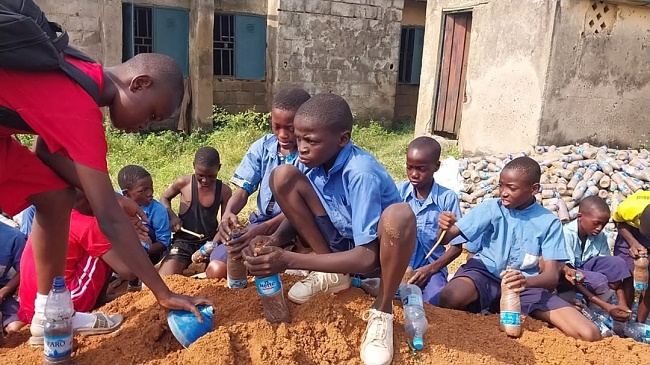A group of environmental rights campaigners has announced a plan to launch their Plastic Eco-friendly Toilet (PET) project in response to the practice of open defecation in public schools.

Conceptualised by Ecocykle Development Foundation (EDF) and supported by Lift Humanity Foundation (LFH), African Environmental Awareness Initiative (AEAI), as well as StepUp Green Climate Warriors (SGCW), the initiative is set to be unveiled on Tuesday, December 6, 2022, at Nyanya-Gbagyi Primary School, New Nyanya, Nasarawa State of Nigeria.
“This project is an innovative approach that is expected to foster massive awareness of plastic pollution and the importance of repurposing waste, especially among young people in Nigeria,” says Aliyu Sadiq, the Co-founder of EDF.
The programme, which started with the collection of over 6,500 plastic bottles that were used to construct the toilets, was also conceived to mitigate the negative impact of plastic pollution on the environment and accelerate the principle of circular economy in the country, he added.
He disclosed that the school was selected ahead of its counterparts for the scheme because of its record of having the highest number of pupils who are still observing the obsolete practice, and lacks access to basic toilet facilities. The other explanation he gave was that most of the students reside in communities with extreme cases of plastic pollution.
The environmental advocate listed the benefits of the project to include the elimination of plastic pollutants, as well as the safeguarding of human and environmental health.
He added that it is also strategically designed to enhance the capacity of young people to stimulate the creation of green jobs, bridge the existing poverty gaps, and inculcate additional skills in waste management among them.
“It created both unskilled and skilled part-time jobs for over 40 residences of the host community, and over 100 students were directly involved at various stages of the project, thus gaining hands-on practical experience on plastic upcycling,” Sadiq said.
In his remarks, the Project Manager, LHF, Emmanuel Nweze, said it was crucial for society to understand the positive effects of proper waste management on the environment and overall economy.
“Therefore, this project is in line with Lift Humanity Foundation’s objective of providing a humanitarian response, climate justice, and addressing the plight of the most vulnerable people in society,” he said.
Nweze urged the government, civil society groups, and other major actors in the environmental protection arena to key into the exercise to end plastic pollution and promote a sustainable lifestyle for everyone.
On his part, the Executive Director, AEWI, Nathaniel Wambebe, stressed the need to empower young people with the skills essential to achieve a sustainable and pollution-free environment.
“This project is critical to us because it utilises plastic waste to eliminate open defecation issues,” he hinted.
By Etta Michael Bisong, Abuja

